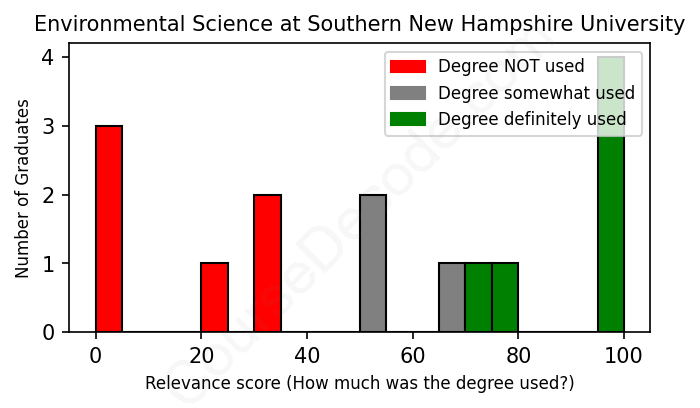
First, some facts. Of the Environmental Science graduates from Southern New Hampshire University we've analyzed , here's how many have used (or NOT used) their degree in their career:

These are estimates based on AI analysis of 15 LinkedIn profiles (see below).
The verdict? Significantly below average. Overall, with an average relevance score of 53%, Environmental Science graduates from Southern New Hampshire University have a much lower likelihood (-14%) of finding work in this field compared to the average graduate across all fields:
And for comparison, here's the chart for all profiles we've looked at across all degrees.
Also, after graduating, only 13% of these graduates have pursued further education other than another Bachelor's degree (such as a Masters degree or other), compared to the average across all profiles of 35%. This suggests a Bachelors degree is enough for most Environmental Science graduates, and it's normal to look for work straight after graduation.
See the details:
|
Relevance score: 100% We think this person has gone into a career highly relevant to their degree. We think this person has gone into a career highly relevant to their degree.
DEGREE INFOGraduated in 2019 from Southern New Hampshire University with a Bachelor's degree in Environmental Science. Also pursued further education since (see below). JOB HISTORY SINCE GRADUATIONProfessional Intern TILLAMOOK ESTUARIES PARTNERSHIP Aug 2020 - May 2021 Monitoring and Outreach Coordinator  Nestucca, Neskowin, and Sand Lake Watersheds Council Aug 2022 - Present FURTHER DEGREES DONE SINCE GRADUATINGMaster of Science - MSUniversity of Hawaii at Hilo 2019 - 2021 ABOUTMy objective is to find a position that will strengthen my knowledge and challenge my experiences along with learning new skills. I want to push myself past my limits and strive to be a valuable employee. I am searching for a position that can help me gain new knowledge and allow me to share that knowledge with my coworkers. I am someone with a strong and positive work ethic that does not give up easily. I show this by always being on time, reliable, honest, thorough, and organized with any position that I have been in. |
The top 10 most common jobs done by the graduates we've analyzed (ranked most common to least) are:
When it comes to graduates from Southern New Hampshire University with a degree in Environmental Science, it seems like there are some clear trends in the types of jobs they land. Many of these individuals have taken on roles that are closely aligned with their field, such as Environmental Health and Safety Specialists, Air Pollution Technicians, and Biological Science Technicians. These roles directly leverage the knowledge and skills they've gained from their studies, allowing them to work on important environmental issues like water quality, waste management, and pollution control. It’s great to see that a significant portion of the jobs are relevant to environmental science, reflecting the degree’s practical applications in the real world.
However, not all graduates found their paths leading them back to the core principles of Environmental Science. Some have taken on positions that seem pretty far removed from their studies, like customer service roles, teaching, or logistics management. These jobs often don't require specialized knowledge from their degree, indicating that while some graduates are making a real impact in the environment-related fields, others are exploring very different career avenues that don’t directly relate to Environmental Science. So, it’s a mixed bag, with plenty of opportunities for those who want to stay in the environmental sector, but also options for those looking to branch out into other industries.
Here is a visual representation of the most common words in job titles for Environmental Science graduates (this is across all Environmental Science graduates we've analyzed, not just those who went to Southern New Hampshire University):

It looks like graduates from Southern New Hampshire University's Environmental Science program have had a pretty mixed bag of career trajectories. Right after graduation, many of them tend to find jobs in roles that are related to environmental science, like working as an Air Pollution Technician or a Wastewater Engineering Clerk. Those early jobs generally align well with their degree, which is a good sign for new grads looking to build relevant experience. However, as time goes on, there seems to be a shift where some graduates do pivot away from environmental roles into completely different fields like retail or logistics. For instance, one graduate went from working in environmental consulting to becoming a teacher, while another moved from being a safety manager to starting their own business. This indicates that while they may start strong, not everyone stays in the environmental science sector long-term.
Fast forward about five years, and you can see a mix of results based on this data. Some alumni are indeed still working within environmental sciences, such as those in roles at the New Hampshire Department of Environmental Services or those involved in watershed councils. Others, however, seem to have ventured into unrelated areas, taking positions like shipping manager or office technician, which may not have anything to do with what they studied. So while it's great that a handful have maintained careers directly tied to environmental science, it does seem like some grads choose paths that may feel a bit disconnected from their original goals. Overall, it's a bit of a toss-up between sticking to a relevant career and branching off into new directions as their professional journeys evolve.
Honestly, a Bachelor’s degree in Environmental Science can be a mix of challenging and manageable, depending on how much you’re into the subject. At Southern New Hampshire University, the classes often cover a lot of ground, like ecology, biology, and environmental policy, so if you're passionate about those topics, it might not feel super tough. But, like any degree, it comes with its share of projects, papers, and sometimes complicated science concepts. If you're willing to put in the effort and stay organized, it's definitely doable. Overall, I’d say it's probably around average in terms of difficulty compared to other science degrees, especially if you engage with the material and use your resources!
Most commonly, in the LinkedIn profiles we've looked at, it takes people 2 years to finish a Bachelor degree in Environmental Science.
Looking at the job trajectories of these Environmental Science grads from Southern New Hampshire University, it seems like there's a mixed bag when it comes to salary potential. Some positions, like Environmental Health and Safety roles or Project Manager at a university, can typically offer decent pay, especially as they gain experience, but others, like teaching or retail roles, usually don’t pay as much, especially early on. Also, some of the more recent grads are entering diverse fields like logistics and design, which could be promising in terms of income if they move up the ladder. Overall, while some of these graduates appear to be on a solid financial path, others might face challenges early in their careers, making it hard to say if they're all making “decent money.” It really depends on their choices and how they navigate their careers down the road.
Here is a visual representation of the most common words seen in the "about" section of LinkedIn profiles who have a Bachelor degree in Environmental Science (this is across all Environmental Science graduates we've analyzed, not just those who went to Southern New Hampshire University). This may or may not be useful:

Here are all colleges offering a Bachelor degree in Environmental Science (ordered by the average relevance score of their Environmental Science graduates, best to worst) where we have analyzed at least 10 of their graduates:
| College | Score | Count |
|---|---|---|
 University of North Carolina at Chapel Hill University of North Carolina at Chapel Hill
|
87 | 10 |
 The Ohio State University The Ohio State University
|
85 | 12 |
 University of Vermont University of Vermont
|
68 | 13 |
 University of Oregon University of Oregon
|
66 | 10 |
 Western Washington University Western Washington University
|
63 | 14 |
 University of Virginia University of Virginia
|
57 | 15 |
 Oregon State University Oregon State University
|
56 | 11 |
 Loyola University Chicago Loyola University Chicago
|
56 | 11 |
 Southern New Hampshire University Southern New Hampshire University
|
53 | 15 |
 University of Phoenix University of Phoenix
|
46 | 15 |
 Florida State University Florida State University
|
45 | 16 |